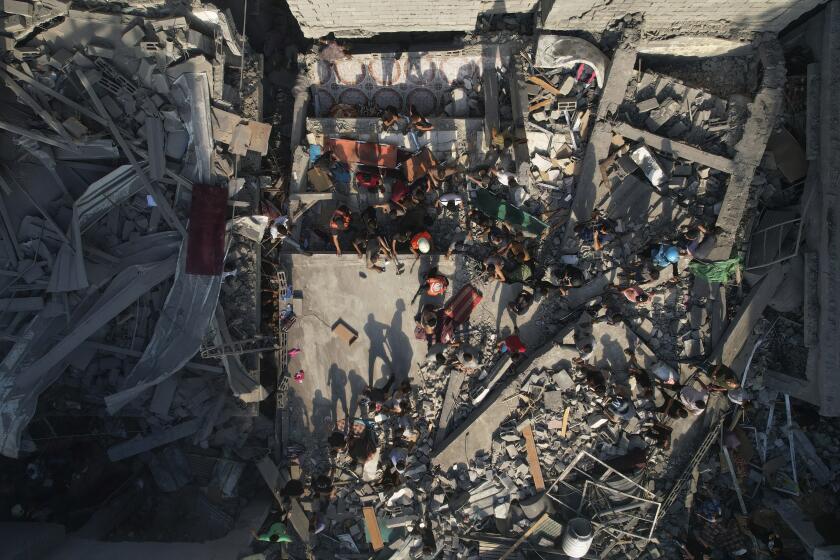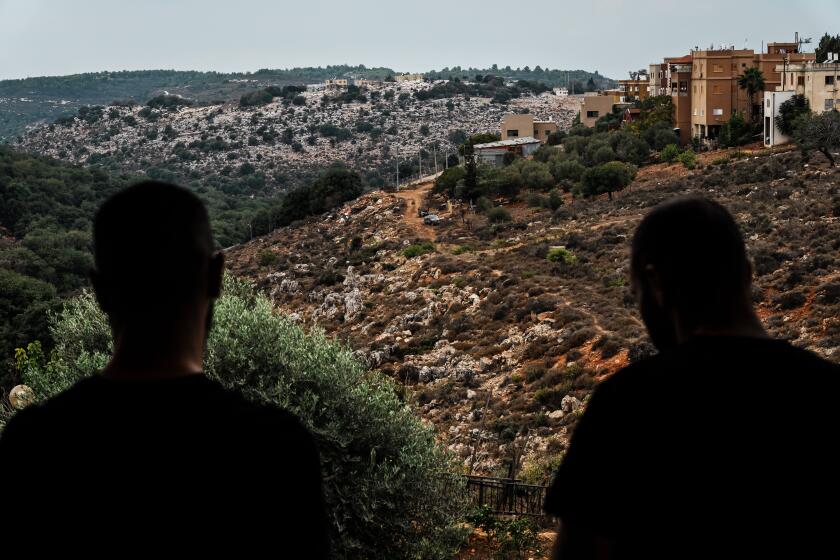How Jewish-Palestinian couples cope with a war that hits too close to home
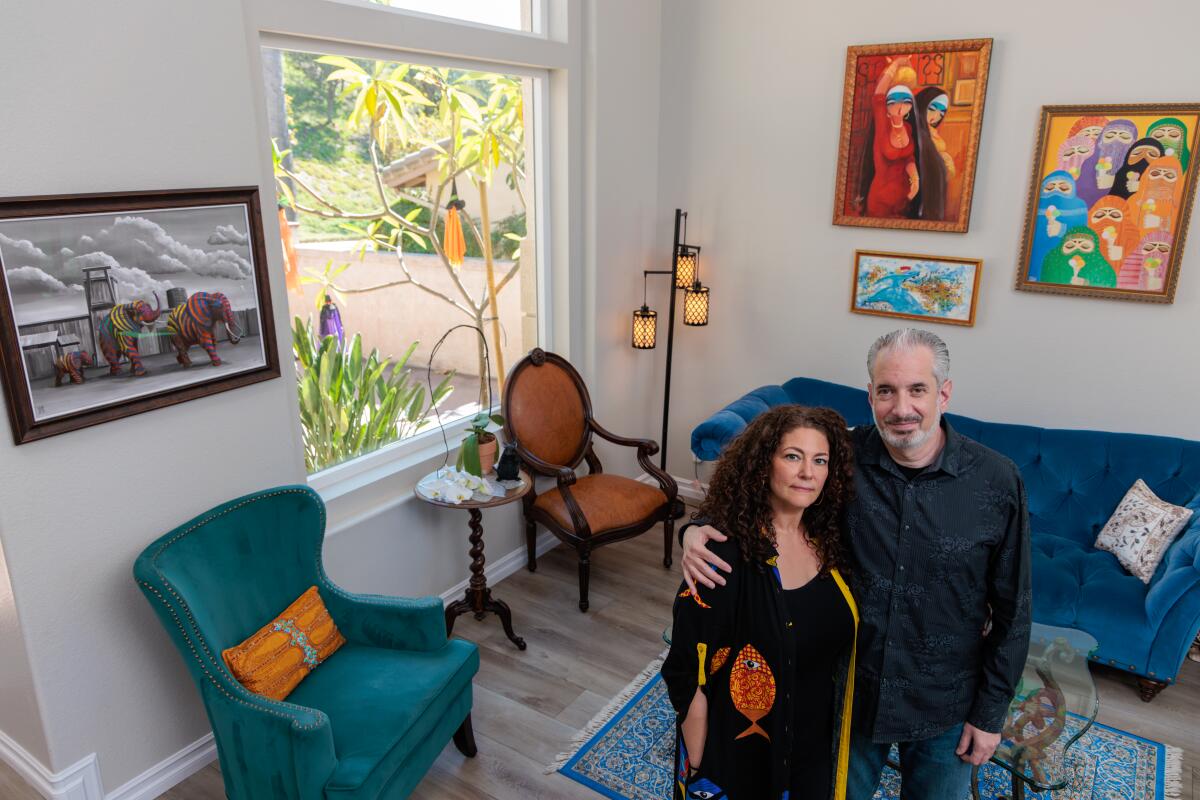
- Share via
The children sat in the back seat of the car as their parents spoke in code.
Mya Guarnieri Jaradat and her ex-husband, Mohamed Jaradat, spoke in snippets of English and Arabic. Sensing something was amiss as they headed to the beach, their 7-year-old daughter asked what was wrong.
“There’s a war in Israel,” Mya said.
“Who are they fighting?” their daughter asked.
Mya is an American Israeli who grew up in Gainesville, Fla. Mohamed is Palestinian. For the last nine years, they have lived in Florida.
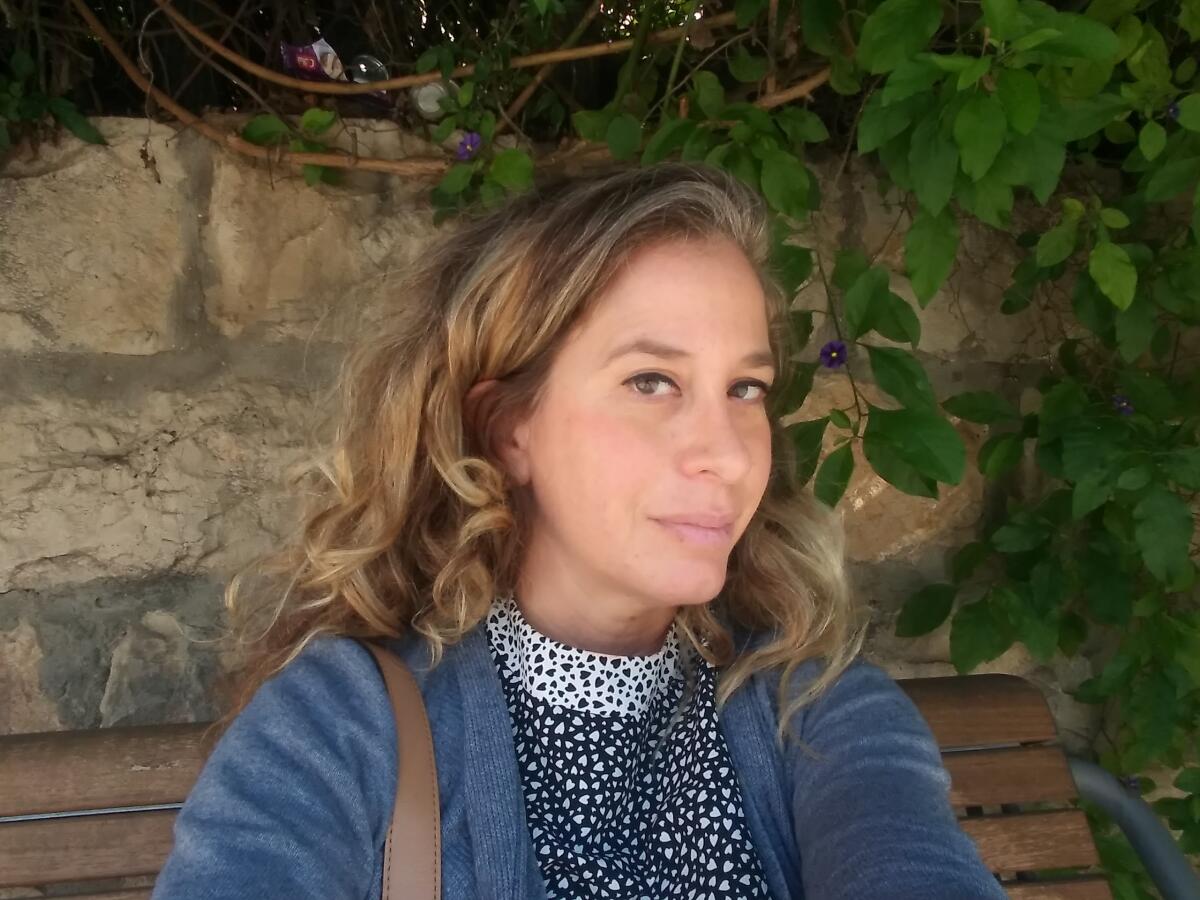
They were quiet for a moment as the little girl waited.
Finally, it was Mohamed who spoke: “The Palestinians.”
The day before, fighters from the Palestinian militant group Hamas had executed a surprise cross-border attack by land, sea and air — the deadliest attack on Israel in 50 years.
More than 1,300 Israelis and 1,900 Palestinians — including many children — have been killed since Hamas fighters attacked southern Israel on Saturday and the Netanyahu government declared war in response. In Israel, Hamas gunmen killed more than 250 civilians at a music festival and took others hostage. In the Gaza Strip, residential neighborhoods were flattened beyond recognition by Israeli bombardment.
The carnage continues with no end in sight.
The conflict in the Middle East has shaped Mya and Mohamed’s lives — and love — since they met in the West Bank more than a decade before. And now, on a sunny weekend in October, that conflict had once again landed squarely on their family.
As Mya and Mohamed struggled to process this latest war, the fault lines of their relationship reappeared. Similar tense scenes have been playing out for Jewish-Palestinian couples across the U.S., where news of the war is omnipresent on computer, cellphone and television screens and in the pages of newspapers.
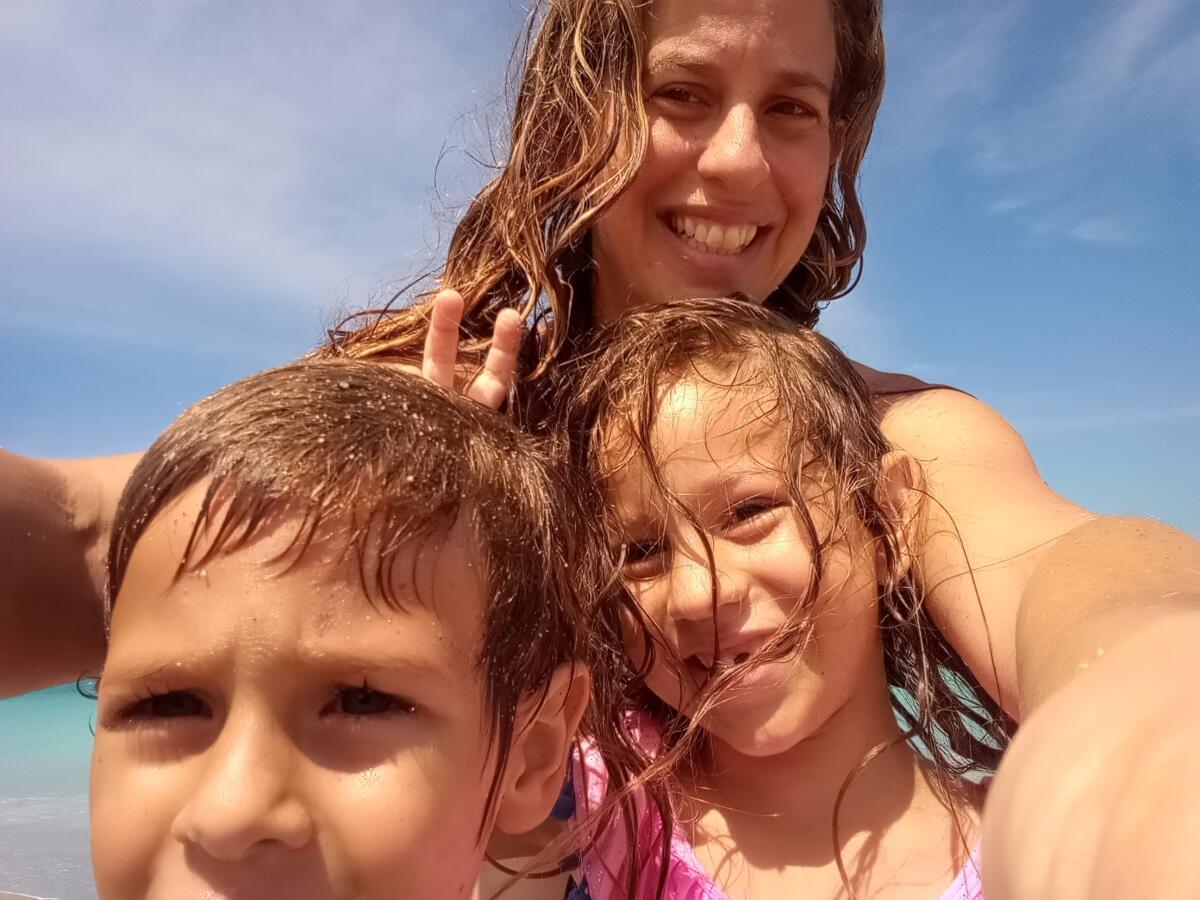
Mya, 43, said she has asked Mohamed “unfair questions” and said things she regretted “that don’t align with my ideology.” But they have also offered each other solace during a time of sadness and anger. Mohamed declined to talk to The Times.
In the case of another couple, a heated dialogue led to blocked texts and a relationship in jeopardy. “To be honest, I don’t know if we’re gonna make it through this moment,” the young Palestinian woman said.
Others have been working through this difficult time the way they have always addressed pain and problems: By listening to each other.
“You work through issues in a marriage,” said Lana Khoury, a Palestinian American whose spouse is Jewish. “This is, in some ways, just one more issue you have to work through.
“And it is probably one that, you know, obviously hits close to home because it’s more personal in some ways. But you still apply those same skill sets to communicating.”
::
Mya and Mohamed met as journalists in 2011. They were working on a story in the West Bank about Palestinians and their thoughts on a bid to the United Nations for statehood.
By that point, Mya, who grew up in a secular family, had been living in Israel for four years. Between interviews, the pair discussed a wide range of topics, including politics, religion, spirituality and Mohamed’s family, which lived in the West Bank.
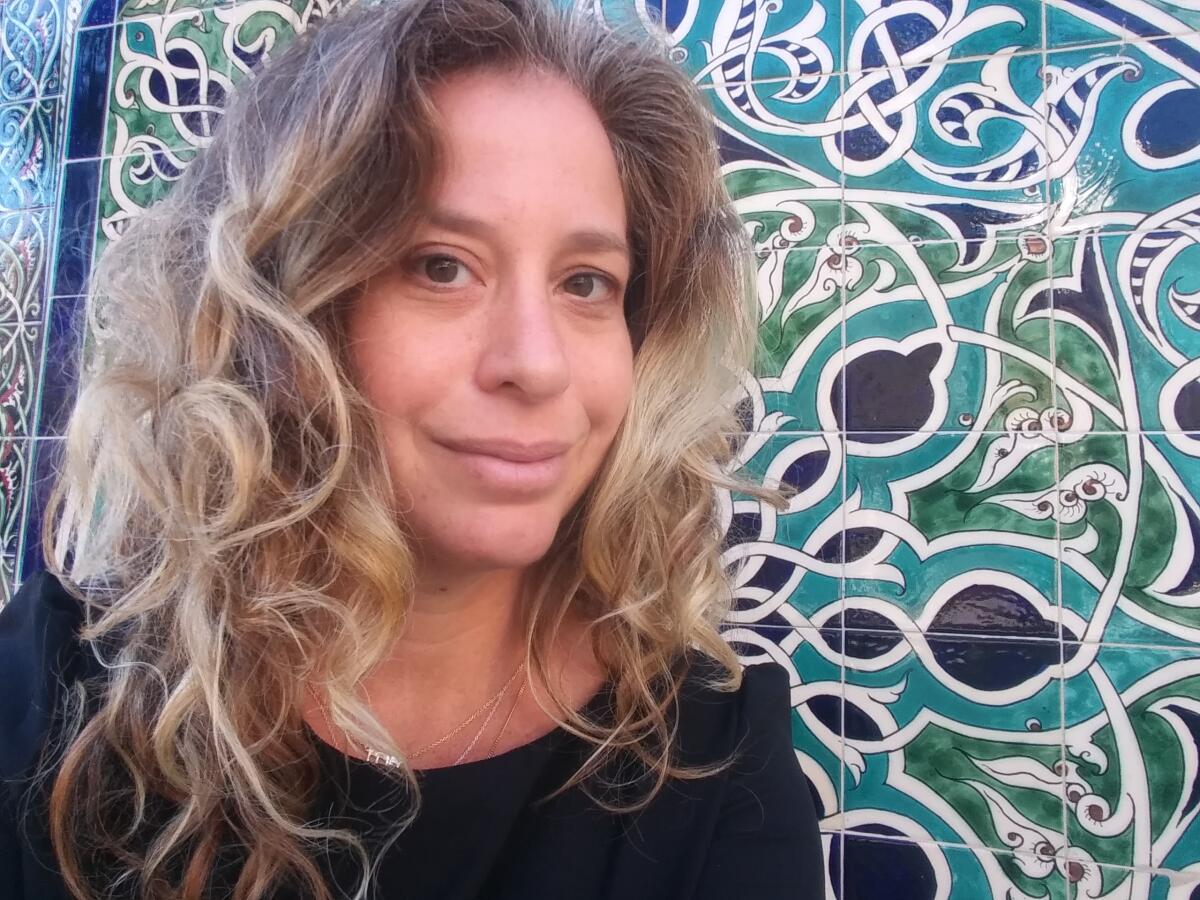
There was chemistry between them, Mya said, but more than a year passed before they began dating. She moved from Israel — where she had citizenship — to the West Bank, where Mohamed and his family lived.
Mya was already well-versed in the Israeli-Palestinian conflict.
“I don’t think I would have dated him if I didn’t have the fluency in the issues that I had at that point,” she said. “Part of the attraction to one another is that he didn’t find a ton of people that understood him and his worldview out there in the West Bank, and I didn’t find a ton of people inside of Israel that understood me and my views. And so I think it felt like a natural match on that level.”
After almost a year together, Mohamed told his parents he planned to marry Mya. But his father, who had been in the Palestine Liberation Organization, rejected the match, meaning they wouldn’t be able to live in the family home. So the couple moved to Florida in 2014 and married that fall.
During the small wedding ceremony, a cantor performed the sheva brachot — the seven blessings — and Mohamed’s brother read a passage in Arabic from the Quran. It was Mya’s way of giving “equal footing to both faiths.”
The following year, while pregnant with the couple’s first child, Mya met Mohamed’s father in Ramallah. He apologized for his initial rejection, which had been rooted in the fact that she is Israeli. He told her that she was now “like a daughter” to him.
Although Mya and Mohamed divorced in 2022, after eight years of marriage, they co-parent and sometimes cohabitate. She is working on a memoir, which will be published in early 2025, that will focus on her life in Israel and the couple’s courtship.
The fact that they did not work out as a couple, she emphasized, “was really less about politics and more about the difficulties that can eat away at any marriage, particularly a marriage that has involved immigration, that has involved maybe a little too much sacrifice on anyone’s part.”
Despite not being husband and wife, after they learned of the recent attack in Israel, Mya said, “there was very much an impulse to be together.”
But some of their conversations have been fraught.
Mya initially found herself questioning Mohamed about whether he supported the attack on southern Israel by Hamas militants and if he felt it was justified.
“I know the answer to that, and I know that he doesn’t [support it], but I had to ask,” she said. “Mohamed, the thing he has emphasized to me over and over again, is that what this one group of people are doing does not represent all Palestinians, obviously.”
“You work through issues in a marriage. This is, in some ways, just one more issue you have to work through.”
— Lana Khoury, a Palestinian-American whose spouse is Jewish
She asked Mohamed if they had stayed in the West Bank, “would I be safe there right now? Or would people have dragged me out of the house and killed me?”
She said she feels guilty now for asking those questions.
Mohamed spoke to Mya about the conditions of people living in Gaza, where he briefly reported in 2013.
“He’s not justifying it, he’s not condoning it, but having seen their circumstances firsthand and having some understanding of what they’ve gone through, he can see how people resort to this level of craziness,” she said. “Again, he doesn’t endorse it.
“We’re both opposed to violence, period. We’re against violence, and we’re against civilians dying needless, senseless deaths that will only bring more violence. That’s the way we see it. It’s not a resolution, and that’s the tragedy of all this too.”
Palestinian Americans with Gaza connections struggle with feelings of helplessness over violence after Hamas’ attack and Israel’s retaliation.
Last weekend, Mya translated for Mohamed what she was reading on social media in Hebrew about Israelis who had gone missing and whose loved ones were searching for them. She showed him their photos.
Mohamed thought he recognized an elderly Israeli woman from those photos. He tried to show his ex-wife a video of someone he believed to be the woman, pointing out that she was smiling while being driven around on a golf cart in Gaza, Mya said.
“I was surprised at my own reaction. I was like, ‘Get that .... propaganda out of my face,’” she recalled. “Someone who is in a situation like that, under stress, they’ve been kidnapped, maybe they’re going to smile in an attempt to soothe their captors. ... That’s a veneer.”
Mya emphasized that Mohamed “has been very patient as I’ve read horrible things to him.” When she cried as she played him an audio clip of a young woman begging for her life, he consoled her.
“I think that’s a deeply political act in this moment,” she said. “And yeah, it’s only happening in our home and maybe I’m naive, but I’d like to think that maybe small things like that in the long run will help to turn the tide and make a difference.”
::
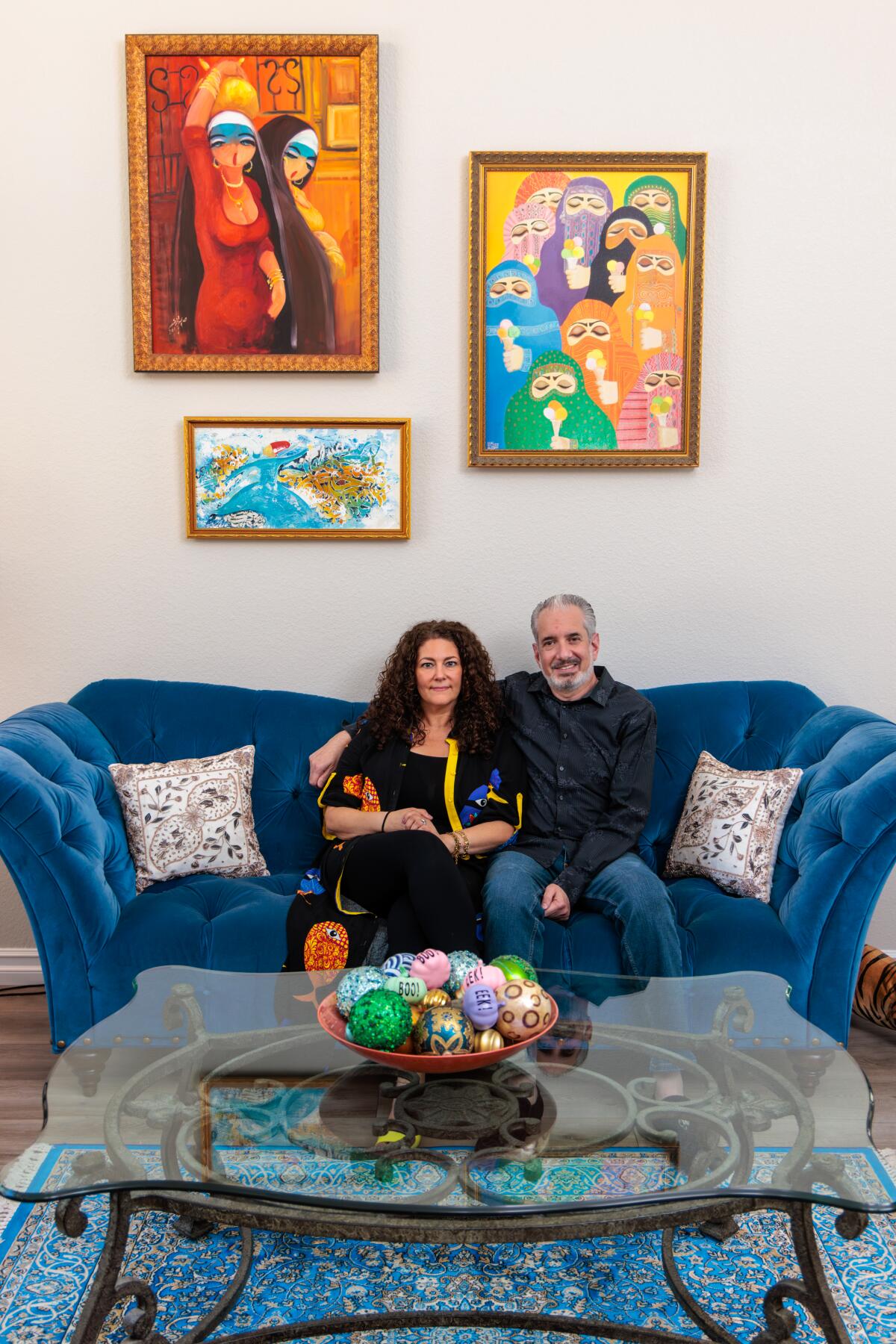
Lana Khoury and Jon Greene’s home in San Diego is a testament to the lives they’ve woven together.
Near their kitchen hangs a framed picture, meant to represent the wall Israel says it built to protect its citizens from attack. On it are the words, “Make Hummus Not Walls.”
In the living room is a glass hamsa, a sign of protection in both Jewish and Islamic cultures, given to them by Greene’s sister who lives in Israel. The hand-shaped symbol was incorporated into their wedding, along with a phrase that means “hand in hand” in Hebrew and Arabic.
Khoury, who was born in Beirut before moving to the U.S., grew up with parents who were prominent in the Palestinian community. Her father is Christian, her mother Muslim. Greene, who was born in New York, grew up in a Jewish home. He attended Hebrew school, was bar mitzvahed and visited Israel a number of times.
They are immigration attorneys by trade and met nearly two decades ago at a conference in Philadelphia. But they didn’t start to date until Khoury moved from San Diego to the East Coast, where Greene lived, for work.
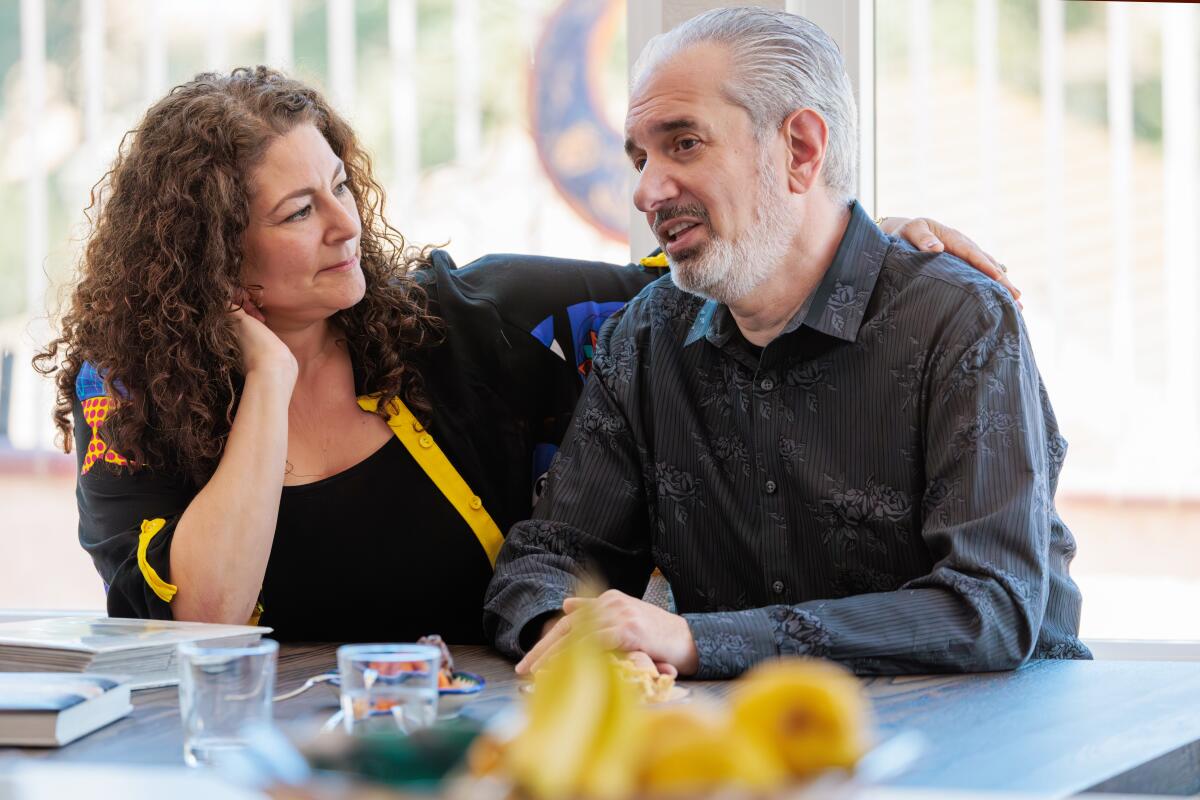
“I remember Jon asking me, ‘Would you date a Jew? Would you date an Israeli?’” Khoury, 49, recalled. “That was my first sort of, ‘God, could I really do that? Would I do that?’ Before that, the answer would have easily been, no, I just can’t imagine that we would have commonality.”
“But I think we got to know each other,” Greene, 58, said. “We’re just two people in this world, and we have cultural differences, and geographical differences. Like lots of people in this country. But when you just see each other as people and you listen to each other, you start hearing each other’s hearts. And that’s how you find your way.”
The couple have had conversations around the current conflict, but Greene said the content of those were personal and private. He questioned whether there’s anything they can add to the public discourse that hasn’t already been said.
At such a fraught time, he said, they worry about the safety of loved ones, and they’re watching events unfold “with concern, like almost everybody in America.”
On Israel’s border with Lebanon, residents are worried that groups like Hezbollah will join a war that eventually spirals into a regionwide conflict.
There’s not much else that can be done.
“We can all dream that we don’t have to worry, that our kids can go one day anywhere they want in the world without having to deal with unrest,” Khoury said.
“And that our Palestinian and Israeli families can find a place where they can coexist with respect and dignity and freedom and opportunity,” Greene added. “And safety and security for everybody.”
“You get older and you think, ‘Is that going to happen in my lifetime?’” Khoury said. “Maybe there was a time I thought, ‘It’s certainly possible.’ But now, you know, I just don’t know.”
::
Doris Bittar, who is of Lebanese and Palestinian descent, and her Jewish spouse, Jim Rauch, have been together more than half their lives, after meeting in a New York high school.
The two live in San Diego, but are currently in Michigan, where Bittar, an artist, is doing a residency at the Arab American National Museum.
They spoke to The Times in a joint interview. When it comes to the Israeli-Palestinian conflict, their views tend to align.
“I think where I would see us as not always aligned is that, she could look at what’s happened and say, ‘This is horrible, but boy we really got them back for a change.’ And I look at it and I just think, ‘It’s just plain horrible,’” Rauch, 64, said. “I don’t think it’s going to change anything, except a lot more dead people and a lot more maimed people.”
Bittar’s response was quick and emphatic. “I don’t like to think they got them back,” she said. “I don’t like to think that, but they’re resisting and I think it’s because they’ve reached the point of no return.”
The pair recently disagreed over a column that suggested Palestinians could remind Israelis and Jewish people that there is a place for them, “in Palestine,” Bittar, 63, recalled. Rauch loved that, Bittar said, “and I read it and I got really pissed off.”
“I just said I am so tired of Jewish people telling Palestinian people what it is they should and shouldn’t be doing when what Jewish people should be doing is just stopping the violence,” Bittar said. “I’m just tired of being told what to do. ... It hasn’t helped.”
In that instance, husband and wife decided to drop the subject altogether. Bittar emphasized that their disagreements “are just frustrations.”
“We’re frustrated that we don’t know how to go forward because we really do believe in peace,” she said. “We do believe peace begets peace.”
More to Read
Sign up for Essential California
The most important California stories and recommendations in your inbox every morning.
You may occasionally receive promotional content from the Los Angeles Times.

